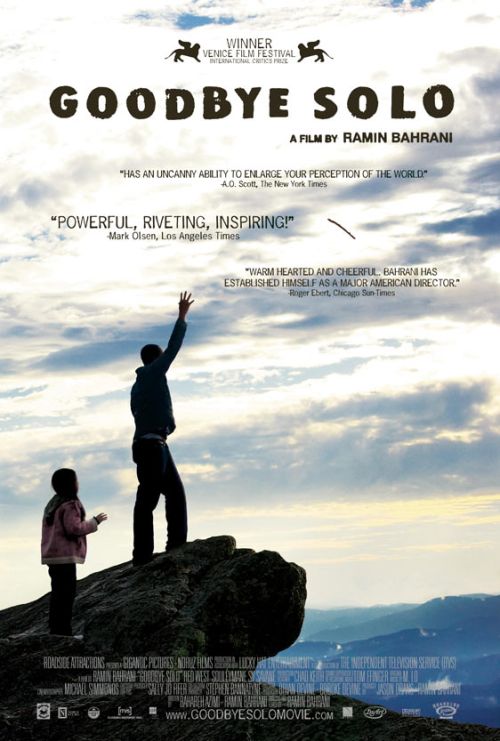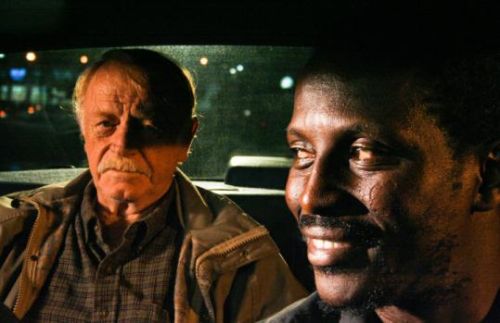Goodbye Solo: The Best Film Released This Year (So Far)

'Goodbye Solo' (I know I've mentioned it before - but it's now out on DVD in the US and just released to cinemas in the UK and Ireland) is the most frustrating film I’ve seen in ages, and also the best film I’ve seen released this year. Ramin Bahrani, recently anointed by no less a credible source than Roger Ebert as ‘the great new American film-maker’ had a lot to live up to after his stunning movies about the economic fringes of the US immigrant experience. ‘Man Push Cart’ and ‘Chop Shop’ tell human, and humane stories about the most mundane of circumstances – the need to make money to survive; but they do it in a way that conveys such urgency, and is completely without cliché that they take on the propulsive force of the most exciting action films.
‘Goodbye Solo’ is set in Winston-Salem, North Carolina, a tobacco town not far from where I live, enervated by the collapse of other industries, and now home to, among others, a large contingent of African men, many of whom drive taxis. As in so many other cities, many of these taxi drivers are highly qualified individuals, who occupied a very different social stratum in their homeland. Coming to America may have granted them a better life – but America has not been as good to them as they hoped.

And so, Souleymane from Senegal (Solo for short) drives folk around Winston-Salem, and picks up William, an elderly white man, who makes an unusual request. He wants to be driven to a mountain range in two weeks’ time, and be left there, no questions asked. He will pay handsomely for the journey, and for the silence. It is obvious that he intends this to be a one way trip for himself. Solo – and we – can’t stand it. Who is this man, William? Why does he want to die? Why does he go to the movies so often? Why does he become violent when queried?
And who is Solo? What happened in Senegal to make him want to leave? Does he love his girlfriend? Will he stay with her? What are his dreams? What does he believe?

The thing is, ‘Goodbye Solo’ never explicitly tells you the answers to these questions; but when it’s over, you know. You know that there is nothing more important than love; that love necessarily presupposes the pain of loss; that the question of will and intention is at the heart of what makes us human. In a recent interview with the director, I asked him if his film challenges the myth of liberal interventionism – the notion that all problems can be solved by an outside force imposing its will. His response put my all-too-fertile critical pretentions in their place. ‘Goodbye Solo’ has no politics, he said – it just wants to ask what would happen if two very different men met at the right time, in the right place; I’d add that it wants to ruminate on the loneliness that post-modern, post-industrial life has bred for so many; most of all, it wants to tell a bloody good story, and tell it more richly, and more believably than anything else I’ve seen this year. It upset me, but it also made me feel more alive. I can’t recommend it highly enough.
This review was originally published in Third Way magazine - check out the magazine here.
 It's that time of year again - you know, when Clint Eastwood releases a trailer for a movie that looks fascinating and completely different from the last thing he did, and your triple reactions run something like this: 1: Hmmm, Clint's got a movie coming out - didn't we just see 'Gran Torino' five minutes ago?; 2: Hmmm, it's got Morgan Freeman playing Nelson Mandela in it - how come no one ever thought of that before?; 3: Hmmm, it's a movie about the
It's that time of year again - you know, when Clint Eastwood releases a trailer for a movie that looks fascinating and completely different from the last thing he did, and your triple reactions run something like this: 1: Hmmm, Clint's got a movie coming out - didn't we just see 'Gran Torino' five minutes ago?; 2: Hmmm, it's got Morgan Freeman playing Nelson Mandela in it - how come no one ever thought of that before?; 3: Hmmm, it's a movie about the  Mandela has rightly become an unimpeachable moral figure, but it's par for the course to ignore what he actually stood for. Mandela is more than a mascot, though our culture might prefer him this way; but he actually has things to say. Icons of moral authority who act toward the common good are often treated this way: I was astonished yesterday to see the digital wall montage that Glenn Beck uses to underline the gravity of what he's saying - accompanied by the invocation 'Speak Without Fear', an image of Dr Martin Luther King, Jr appeared, leading into Beck denouncing (yet again) concerns about climate change, and announcing his willingness to go to prison
Mandela has rightly become an unimpeachable moral figure, but it's par for the course to ignore what he actually stood for. Mandela is more than a mascot, though our culture might prefer him this way; but he actually has things to say. Icons of moral authority who act toward the common good are often treated this way: I was astonished yesterday to see the digital wall montage that Glenn Beck uses to underline the gravity of what he's saying - accompanied by the invocation 'Speak Without Fear', an image of Dr Martin Luther King, Jr appeared, leading into Beck denouncing (yet again) concerns about climate change, and announcing his willingness to go to prison  So I was up early this morning having slept restlessly after watching the end of 'Battlestar Galactica' last night (no spoilers - suffice it to say that fans of Richard Dawkins and Thomas Merton may find themselves both satisfied; I certainly was). Cylons colonised my repose (for some reason the early models, one of whose bosses is depicted above, were the stuff of my childhood nightmares), but I managed to avoid the bad dream I might otherwise have had when I was younger and less apt to resist imagining the imminent doom of the planet. I have a sensitive constitution, as they say. Which segues neatly into the reason for this post: why I am about to let you, dear reader, down.
So I was up early this morning having slept restlessly after watching the end of 'Battlestar Galactica' last night (no spoilers - suffice it to say that fans of Richard Dawkins and Thomas Merton may find themselves both satisfied; I certainly was). Cylons colonised my repose (for some reason the early models, one of whose bosses is depicted above, were the stuff of my childhood nightmares), but I managed to avoid the bad dream I might otherwise have had when I was younger and less apt to resist imagining the imminent doom of the planet. I have a sensitive constitution, as they say. Which segues neatly into the reason for this post: why I am about to let you, dear reader, down.



 I saw 'Jaws'
I saw 'Jaws' 
 Just a brief post from me as I'm on my way to Nashville to, among other things, meet up with
Just a brief post from me as I'm on my way to Nashville to, among other things, meet up with